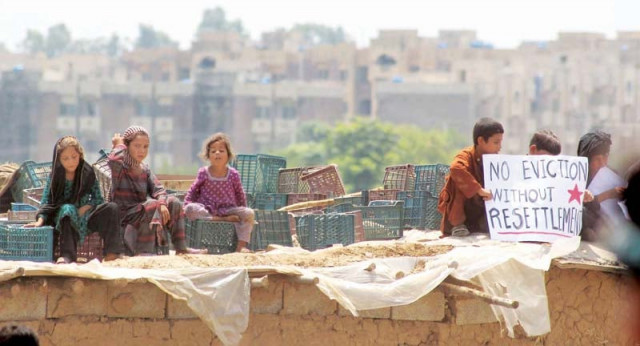Housing crisis: As CDA remains clueless, town planner offers viable solution
Two residential sectors can be developed for 60% of capital residents who belong to low-income group

Two residential sectors can be developed for 60% of capital residents who belong to low-income group.
As federal capital’s civic managers remain clueless about the growing problem of housing units for the low-income people, an expert on urban planning offers a viable solution to the issue.
One or two sectors can be developed for constructing housing units only for the working class and low-income people that can solve the problem, Tasneem Siddiqui said.
Talking to The Express Tribune on Sunday about possible solution to the issue, Siddiqui, an expert on low-income public housing called for a revision of Islamabad’s Master Plan for provision of affordable housing for the poor, either on rental or ownership basis.

“If the CDA can introduce 17 changes to it [Master Plan] than why not one more to pave way for establishment of one or two full-fledged residential sectors only for the poor and low-income groups,” he suggested. He commented that establishment of one housing colony — such as the CDA’s unsuccessful venture of Farash Town would not serve the purpose.
Siddiqui said that the project was praiseworthy, but it fell victim to the corrupt practices rampant at the CDA, and its officers and property mafia bought plots at throwaways prices allotted to the poor.
He said that in KKB project, plots were given to residents of informal settlements and it was ensured that after allotment, their squatter be demolished. “And allotment of all those plots cancelled, where owners were not constructing homes,” Siddiqui said.
“This method was not followed by the CDA and it resulted in failure,” he said.
In Islamabad, Siddiqui said, we had a limited number of housing units for low-grade government employees and the issue of shortage of housing for them should also be considered.
“Sixty per cent of Islamabad’s residents belong to low-income groups but while developing housing schemes this reality is not considered by the authorities as well as the private developers,” Siddiqui said.
According to a recent survey by the interior ministry 85,000 people were residing in informal settlements.
Siddiqui lamented that government’s policy of 2002 “Housing for All” provided for regularisation of informal settlements established before 1995.

Siddiqui said that the government and its departments should realise the fact that if they need labourers and domestic workers to keep the city functioning properly than they should pay heed to their housing needs too.
Meanwhile CDA in its reply submitted to the country’s top court recently mirrors the fact that it does not have any solution at hand to deal with the growing challenge of housing for low-income people in the capital.
The CDA is responsible for planning and development of the city, but doing so it ignores completely the affordable housing needs of thousands of city’s poor and working class.
The civic agency’s reply to the Supreme Court in the case of demolition of informal settlement of I-11, cites some decades-old decisions of the government regarding katchi abadis. Interestingly, the reply is totally silent on as to how the CDA will deal with the issue, except a plan which provides for bulldozing such settlements.
An urban planner by profession, Siddiqui was conferred Aga Khan Award for Architecture in 1995 for his commendable role in establishment of the Basti.
Siddiqui advocates replicating the KKB model in Islamabad, to overcome the issue of low-income housing for the poor.
KKB was initiated in 1986 by the Hyderabad Development Authority and replacing the restrictive governmental processes for acquiring land, allotment procedures, with innovative approaches.
“Unfortunately, successive governments in the centre and their policies over housing only cared for the rich and influential,” Siddiqui said, adding they never bothered about the aggravating situation of absence of affordable housing for the poor.
Published in The Express Tribune, August 31st, 2015.












1724319076-0/Untitled-design-(5)1724319076-0-208x130.webp)






COMMENTS
Comments are moderated and generally will be posted if they are on-topic and not abusive.
For more information, please see our Comments FAQ